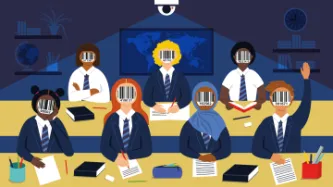Search
Content type: News & Analysis
Also available in English.A Relatora Especial da ONU sobre o Direito à Educação publicou seu relatório sobre liberdade acadêmica - que, entre outras coisas, recomenda que os Estados banam as tecnologias de reconhecimento facial das instituições educacionais.O sistema educacional do Brasil, que se baseia no valor fundamental “o melhor interesse da criança” é um dos piores infratores do mundo. Até o momento, 1.667 escolas só no estado do Paraná adotaram uma tecnologia que, segundo o principal…
Content type: News & Analysis
Também disponível em portuguêsThe UN Special Rapporteur on the right to education published her report on academic freedom, which recommends that states ban facial recognition technologies from educational institutions.Brazil’s educational system - which is built on the fundamental value: the best interest of the child, is one of the world’s worst offenders. So far 1,667 schools in the state of Paraná alone have adopted a technology that the UN’s leading expert believes threatens student’s…
Content type: Examples
Human Rights Watch called on the national government of Brazil to amend the country's data protection law to add new safeguards to protect children online following the discovery that seven educational webistes directed at Brazilian students, including two created by state education secretariats, used tracking developed for advertising purposes to surveil children, harvested their personal data, and sent it to third-party companies. The websites watched children in their online classrooms and…
Content type: Examples
Following a report from Human Rights Watch, The Public Ministry of São Paolo began an investigation to find out whether government education platforms and services collected students' personal data and sent it to adtech companies in violation of the General Data Protection Law. Article: São Paolo ministry investigates education websites for dataveillance Publication: G1Writer: Arthur Stabile
Content type: Examples
Education experts and publishers in Brazil are warning of the negative consequences of a decision by the São Paolo state government to replace textbooks with ebooks for students over 14 starting in 2024. Many students have no Internet access, and publishers argue it will irreparably damage the testbook industry.Article: Brazilian educators oppose ebook replacement for textbooks Publication: Phys.org Writer: Phys.org
Content type: Examples
After an in-person auction in São João let Brazilian technology companies bid for a contract to supply facial recognition technology to the public school system. PontoID, which won the $162,000 contract, began secretly rolling out the technology without informing parents or students in advance. The goal was to help track school attendance; parents would receive a text message when students arrive and leave school. In some towns, more than 80% of the population are of African descent; facial…
